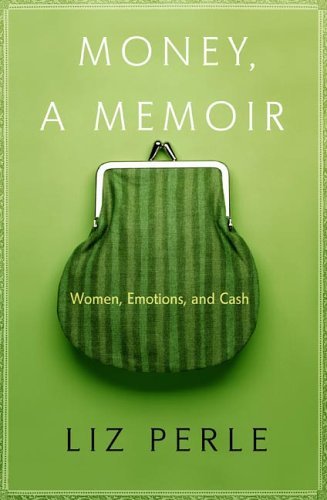Consider that for many women, the one last taboo topic of discussion among us (and in our own inner dialogues) is money.
Consider these statistics on our relationship with money:
- 40% of us still admit to lying to our partners about what something costs.
- 70% of men feel they are entitled to earn more than any one else, while a similar percentage of women said they should earn what others earned.
- 85% of men said they knew what they were worth. A similar number of women responded that they weren’t sure.
- Women aged 45-54 earn 75% of what men do; however, women aged 20-24 now earn nearly 94% of men’s salaries.
- 55% of married women bring in half of the household income and 25% now out-earn their spouses.
- 52% of women expect to continue to work once they reach retirement age
- Of those women who say they feel in control of their lives, 56% of them saved and invested monthly.
This complex relationship we have is captured well in the new book, “Money, A Memoir” by Liz Perle
| While some of the stats above reflect the real strides women are making on the financial front, Perle also observed a persisting anxiety and ambivalence in women when it came to their personal relationship with the dollar. Sparked by finding herself in a divorce and having to support her 4-year-old son, Perle first confronted her own relationship with money… and then sought to understand it’s contours for women in general. |
|
One of the interesting things she learned:
Women don’t fight for money the way men do— and specifically don’t ask to be paid what we’re worth. Part of this is due to what Perle feels is the “hardwiring” of our gender: since it is in the nature of women to survive by keeping relationships and networks in working, mutually supportive order, behaviors that might involve pitting one person against another (even in the name of making more money) are not going to feel right or comfortable. This is one of the reasons that women rarely share salary information with one another. Doing so establishes instant hierarchies, which, by their very nature, put us on different planes from one another, thus separating us.
We are willing to sacrifice money for connection. But the trade can hurt us financially. Perle challenges some of the money “myths” in which we often immerse ourselves, i.e. “I don’t buy for myself” or “I bought it on sale” (ok, still not sure what’s wrong with that one)… or, “If I ask for too much money, I will lose the job.” However, her overriding point is that women often have an emotional relationship with our money… and might be better served to separate feelings from finance.
Or check it out at moneyamemoir.com
Enjoyed this Momorandum? Forward it to a friend… and visit us often at www.executivemoms.com!












Add Your Comment